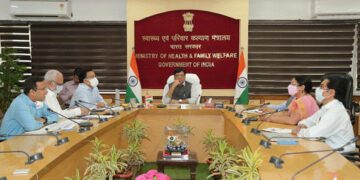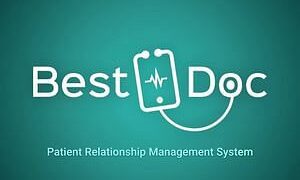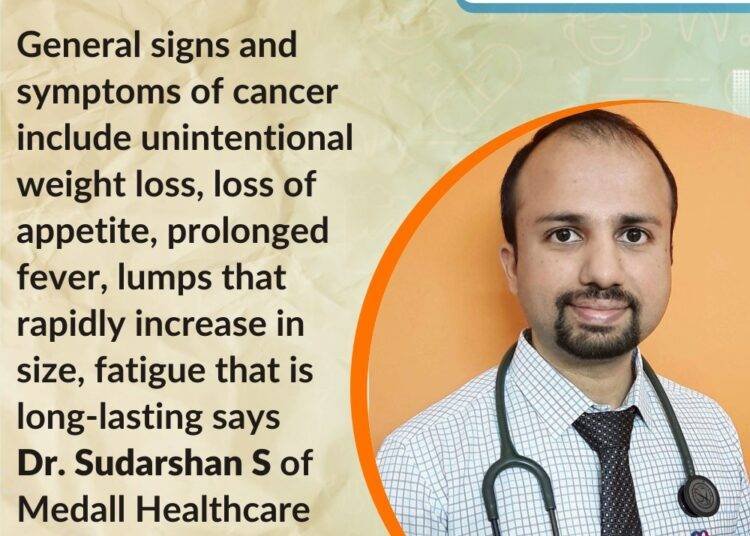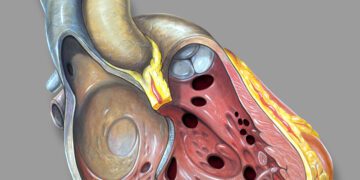By Dr. Sudarshan S
Cancer can have a wide range of symptoms both specific to the organ/tissue involved and generalised systemic symptoms. General signs and symptoms of cancer include unintentional weight loss, loss of appetite, prolonged fever, lumps that rapidly increase in size, fatigue that is long-lasting.

Screening is defined as the usage of diagnostic methods to diagnose a condition in an asymptomatic individual i.e., before the onset of symptoms. In order to diagnose cancer at an early stage (including pre-cancerous lesions), there are screening tests available for certain cancers. An ideal screening test should find cancer early, be highly sensitive and specific, have more benefits than harms (by avoiding over-diagnosis, by avoiding being falsely positive or false negative). There are guidelines for screening for certain types of cancer depending on the age and sex of the individual. The following are some of them:
A) Breast Cancer:
Screening for breast cancer should start at 40 years of age. The screening test recommended is a mammogram along with a clinical breast examination. Screening mammogram is suggested once every 2 years, till the age of 74 years.
B) Cervical Cancer:
Screening tests include PAP smear test and HPV test. Expert groups recommend screening using PAP test as early as 21 years of age in a female and end at age 65 (Women who are otherwise not at high risk for cervical cancer). HPV test to be carried out once every 5 years beginning at age 25 years, PAP smear once every 3 years in an otherwise healthy woman.
C) Lung Cancer:
A screening test is indicated in heavy smokers, between the ages of 50 to 80. A low dose helical CT scan of the chest is a screening modality in such patients (heavy smokers) and it has believed to reduce cancer-related deaths by diagnosing cancer early.
D) Prostate Cancer:
PSA (Prostate Specific Antigen) test along with Digital Rectal Examination of the prostate has been used to screen prostate cancer. However, experts now say that routine screening with PSA is not needed as false negative and false-positive results may occur, and treatment of PSA detected cancer has not been shown to reduce deaths from prostate cancer.
Screening for Colorectal cancer is mostly done in Western countries where the incidence of colorectal cancer is higher than in India. Screening tests are commenced at the age group of 45-50 and carried through 75 years of age using stool tests (Stool occult blood and stool DNA tests) colonoscopy and sigmoidoscopy.
The following are the list of screening tests for people with increased risk of certain cancers, where the screening test may be offered “selectively”:
- Alpha fetoprotein test: – Offered to those with a high risk of liver cancer, along with ultrasound imaging.
- Breast MRI: – Offered to high-risk individuals who have BRCA-1 and BRCA-2 gene mutation history.
- CA 125 test: – Offered to women who have increased risk of ovarian cancer and to detect recurrence of the disease in a woman previously diagnosed with ovarian cancer. Often combined with Transvaginal ultrasound imaging.
- Skin exams: – Done by self-skin exam or examination by a health care provider. Useful only for those who are at increased risk of developing skin cancer.
As technology is advancing, the guidelines for screening certain types of cancer will continue to vary in the future depending on the accuracy of the tests and the mortality benefit the tests would offer by detecting cancer early. It’s best that you speak to your doctor if you have any risk factors for cancer and be informed on recommended screening tests to detect common cancers depending on your age and gender. Remember that cancer is curable if diagnosed at an early stage. Nevertheless, it’s important to follow a healthy lifestyle to prevent the occurrence of certain cancers.
The writer is Consultant Physician at Medall Healthcare
Follow Health In Five on LinkedIn, Facebook, Twitter & Instagram
Subscribe on WhatsApp & Telegram to receive real time updates







































